最新广州版六年级英语上册Unit--Unit12知识点及练习题
七年级英语下册(人教版)Unit12第1课时(SectionA1a2c)说课稿
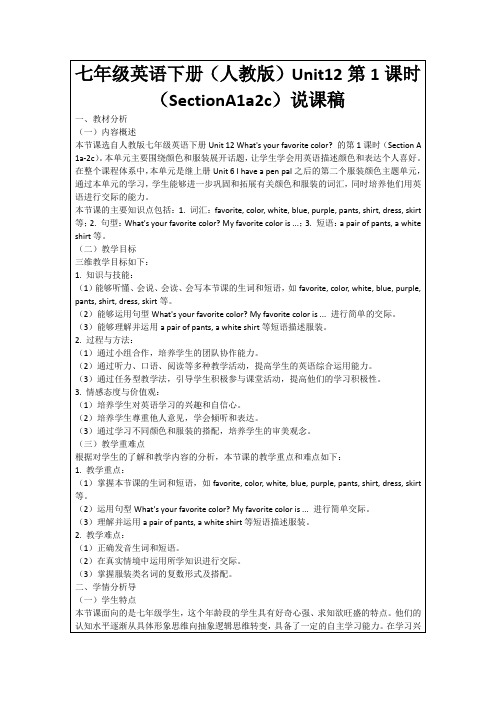
3.不断提高自身教学水平,学习新的教学理念和方法,以适应学生的需求。
(3)掌握服装类名词的复数形式及搭配。
二、学情分析导
(一)学生特点
本节课面向的是七年级学生,这个年龄段的学生具有好奇心强、求知欲旺盛的特点。他们的认知水平逐渐从具体形象思维向抽象逻辑思维转变,具备了一定的自主学习能力。在学习兴趣方面,学生对新鲜事物充满好奇,喜欢通过游戏、互动等形式学习英语。此外,学生在学习习惯上,已初步形成了合作、探究的学习方式,但仍有部分学生依赖性强,需要教师引导和督促。
(二)教学目标
三维教学目标如下:
1.知识与技能:
(1)能够听懂、会说、会读、会写本节课的生词和短语,如favorite, color, white, blue, purple, pants, shirt, dress, skirt等。
(2)能够运用句型What's your favorite color? My favorite color is ...进行简单的交际。
七年级英语下册(人教版)Unit12第1课时(SectionA1a2c)说课稿
一、教材分析
(一)内容概述
本节课选自人教版七年级英语下册Unit 12 What's your favorite color?的第1课时(Section A 1a-2c)。本单元主要围绕颜色和服装展开话题,让学生学会用英语描述颜色和表达个人喜好。在整个课程体系中,本单元是继上册Unit 6 I have a pen pal之后的第二个服装颜色主题单元,通过本单元的学习,学生能够进一步巩固和拓展有关颜色和服装的词汇,同时培养他们用英语进行交际的能力。
(三)பைடு நூலகம்动方式
六年级上册英语教案-Unit12 It'sChristmasagain!湘少版

六年级上册英语教案Unit 12 It's Christmas again! 湘少版教学内容本单元主要围绕圣诞节这一主题展开,教学内容包括圣诞节的基本知识、习俗以及相关的英语表达。
通过学习,学生能够掌握与圣诞节相关的词汇和句型,并能够运用这些知识进行简单的英语交流。
教学目标1. 知识与技能:学生能够掌握与圣诞节相关的词汇和句型,能够用英语描述圣诞节的习俗和活动。
2. 过程与方法:通过小组合作、角色扮演等活动,培养学生英语口语表达能力和合作能力。
3. 情感态度价值观:学生能够了解并尊重不同文化背景下的节日习俗,培养跨文化交流的意识。
教学难点1. 与圣诞节相关的词汇和句型的掌握。
2. 学生能够运用所学知识进行真实情境的英语交流。
教具学具准备1. PPT课件:包括与圣诞节相关的图片、音频和视频。
2. 教学卡片:包括与圣诞节相关的词汇和句型。
3. 学生用书和练习册。
教学过程1. 导入:通过播放圣诞歌曲或展示圣诞图片,引起学生对圣诞节的兴趣,导入本节课的主题。
2. 新课呈现:通过PPT课件,呈现与圣诞节相关的词汇和句型,引导学生跟读和模仿。
3. 操练:通过小组合作、角色扮演等活动,让学生运用所学知识进行英语交流。
4. 巩固:通过练习册上的练习,巩固学生对词汇和句型的掌握。
6. 作业布置:布置与圣诞节相关的作业,让学生在课后进行巩固和练习。
板书设计1. Unit 12 It's Christmas again!2. 词汇:圣诞节相关的词汇,如圣诞树、圣诞老人、礼物等。
3. 句型:与圣诞节相关的句型,如"It's Christmas again!"、"I want a"等。
4. 重点和难点:突出显示本节课的重点和难点,方便学生记忆和理解。
作业设计1. 词汇填空:根据句意,选择适当的词汇填空。
2. 句型转换:将所给句子转换成与圣诞节相关的句型。
3. 小作文:用英语描述自己最喜欢的圣诞节习俗。
教科版六年级英语(广州版)上册_Unit12_教学设计

Unit12 教学设计【内容来源】教育科学出版社(三起点)六年级上册Module6 Festivals【主题】Christmas(一) Let’s readLearning objectiveTo learn/ revise the following language items through a passage:—Using the Simple Present Tense to describe how people spend a festival—Nouns: ham, potatoes, Christmas turkey, sock, Father Christmas—Verb phrases: hurry, put up a large Christmas tree, share, get many wonderful presents, bring gifts to children, open their gifts—Adjective: excited, important, wonderfulSuggestions• The passage is ab out what people in many countries do at Christmas.• Have pupils look at the pictures on Pages 68-69. If you use the e-Resource, show the pictures on the screen.• Talk about the picture with pupils. Invite pupils lo guess wha t festival the children are having. Revise, or present, the vocabulary related to Christmas from the picture.• Set a pu rpose for reading the passage: In many countries, Christmas is many people’s favourite festival. People do many things during Christmas. What do they do? Let’s read a nd find, out.• Have pupils read the passage silently all the way through. You may invite pupils to have a first attempt at answering the comprehension questions.• When pupils have finished reading the passage silently (and attempted the comprehension questions), play the recording, or the e-Resource, for pupils to listen to the passage. Pause the recording at suitable points to clarify meaning and highlight the target language items.• Have pupils answer the comprehension questions, or look at their answe rs again if they have had a first attempt already.• Check the answers with pupils.• If you use the e-Resource, have pupils record their reading aloud using the Listen and repeat function.• Invite pupils to tell you whether they like Christmas.• Discuss with pupils what they like doing during their favourite festival.Answer key(1) On December 25th.(2) They put many gifts for everyone to share.(3) He is a fat happy man in red clothes.(4) Under the Christmas tree or in a sock.(5) They come together for a big Christmas lunch or dinner.(二) Fun with language1. Listen and tick or cross. (Page 70)Learning objectiveTo listen to, with understanding, a description of what people do on Easter Day.Suggestions• Have pupils look at Task 1 on Page 70. If you use the e-Resource, show the task on the screen.• Explain to pupils that they are about to hear someone talki ng about what people do on Easter Day, an important festival in some Western countries.• Ask pupils to study the 5 sentences in Task 1 and guess which ones are correct.• Go through’ any vocabulary item in the 5 sentences that may be new to pupils.• Explain the task. Play the recording, pausing after each question for pupils to tick or cross.• After the last question, play the recording again for pupils to check their answers.• W hen pupils have finished, check the answers with pupils.Tapescript sHello, everyone. I, d like to tell you a little about Easter Day.Easter is one of the important festivals in Western countries. It comes at the beginning of spring, usually on a day between March 22nd and April 25th .Before Easter Day, people will colour eggs and give them to each other. They beli eve “All life comes from an egg.” Then on Easter Day children wake up and find that the Easter Rabbit leaves them baskets of sweets. He also hides the coloured eggs around the house. Children look for the eggs and the child with the most eggs wins a prize.For Easter, coloured eggs, rabbits, and flowers all mean rebirth and new life.Answer hey(1)×(2)×(3)√(4)×(5)√2. Compare and write. (Page 70)Learning objectivePupils compare the Spring Festival and Christmas and write down the differences.Language focus:All the language items that pupils have learnt in this module for describing festivals.Suggestions• In this task, pupils use all the language items they have learnt for describing festivals for comparing the Spring Festival and Christmas in writing.• Have pupils look at Task 2 on Page 70.• Invite pupils to briefly tell you what they know or remember about the 2 festivals.• Explain t he task. You may need to work through the first question (Things people do before the festival)with pupils as an example.• Give pupils time to finish the writing. They may need to turn back to the previous pages for the necessary language to complete the task.• When pupils have finished, invite them to present their work to the class, either orally, or by posting their work on the display board.3. Read and answer. (Page 71)Learning objectiveTo read, with understanding, a passage about how people in some countriescelebrate New Year’s Day.Language focus:—The Simple Present Tense for descriptions of general facts.—Nouns/ Noun phrases: peace, rest t happiness, health, wealth, coins, wedding, rice, cakes, heart, wedding, the year ahead—Proper nouns: Japanese, the Philippines, Germans—Verbs/ Verb phrases: welcome, jump about, make sure—Adjectives: exciting, huge, special, comingSuggestions• In this task, pupils read a passage about how people in Japan, the Philippines, and Germany celebrate New Year’s Day.• Start by revising with pupils how the Chinese people celebrate the Spring Festival. Revise the related vocabulary.• Tell pupils that in many countries New Years Day is an important festival, citing Japan, the Philippines and Germany as examples. Present the names of these countries, as well as Japanese and German.• Have pupils look at Task 3 on Page 71. Set a purpose for the reading: What do people in Japan, the Philippines and Germany do on New Year’s Day? Let’s read and find out.• Explain the reading task. Then give pupils time to read the passage and answer the questions. Refrain from explaining the passage to pupils sentence by sentence before pupils have a chance to attempt the reading.• When pupils have finished, you may check the answers with them. Alternatively, have them compare answers in pairs, and then present their answers to the whole class.• Go back to the passage and use the context to present or cl arify the meaning of the new vocabulary in the language focus.Answer key(1) Rice cakes.(2) They want to grow taller in the coming year.(3) Health and wealth.(4) A travel.(5) To make sure they have enough to eat in the year ahead.4. Do the project. (Page 71)Learning objectiveTo use the language items learnt in this module in producing a poster for an invented festival.Suggestions• Have pupils recall the names of the festivals they have learnt.• Tell pupils that sometimes people invent special festivals for fun. Have pupils read Step 1 in Task 4 on Page 71 for some examples.•You may ask pupils to use their imagination and think of more possible festivals. Put their ideas on the board.• Explain the project.• Give pupils time to prepare their project. You may allow pupils to work individually or in groups.• When pupils have finished, invite them to share their project either orally or by posting their work on the display board.(三) Story timeRead and act. (Page 72)Learning objectiveTo read a fun story which incorporates several language items pupils have learnt in the module.Words in context:dressed like, Halloween, sweets, trick or treat, some treats, play a joke on, scared Suggestions• In the story, Ben, Jiamin and Xiaoling are dressed in a strange way for Halloween. Aki learns about the game “Trick or treat” from them. When he tries the game on a boy, he gives the boy a big scare.• Have pupils look at the pictures on Pag e 72. If you use the e-Resource, showthe page on the screen.• Go through the first picture with pupils. Talk about the picture with pupils. Present the name of the festival Halloween. Ask pupils what they know about Halloween.• Set a purpose for the rea ding: The children are dressed up for Halloween. Why do they do that? What will they do? What will Aki do? Let’s find out.• Play the recording. Pupils follow by looking at the text in their book.• Play the recording again, pausing after every picture to check understanding or clarify meaning.• Play the recording all the way through again for pupils to listen to and read the whole story one more time.• If you use the e-Resource, play the story video for pupils to view the story. You may use the Listen and repeat function for pupils to practise reading the sentences correctly. You may also use the Role play function for pupils to join the dialogue in different roles.• You may disc uss the second last picture with pupils. What is happening?• Have pupils act out the story in groups.(四) Did you know?Learning objectiveTo learn about different ways that Chinese and American people celebrate various festivals.Suggestions• Have pupils recall how the Chinese people celebrate various festivals. You may allow them to refer back to the previous pages.• Set a purpose for the reading: Chinese families do different things during different festivals. What about American families? What festivals do they have? How do they celebrate these festivals?• Have pupils look at the picture on Page 73. If you use the e-Resource, show the pictures on the screen.• Give pupils time to study the pictures to try to understand them.• Show pupils how to say the names of the American festivals and have them repeat the words after you.【教学反思】。
广州版六年级英语上册unit12练习题
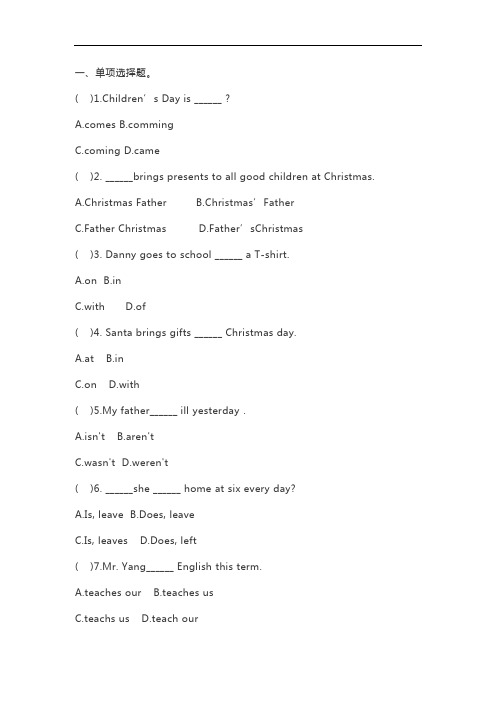
一、单项选择题。
( )1.Children’s Day is ______ ?esmingingD.came( )2. ______brings presents to all good children at Christmas.A.Christmas FatherB.Christmas’FatherC.Father ChristmasD.Father’sChristmas( )3. Danny goes to school ______ a T-shirt.A.onB.inC.withD.of( )4. Santa brings gifts ______ Christmas day.A.atB.inC.onD.with( )5.My father______ ill yesterday.A.isn'tB.aren'tC.wasn'tD.weren't( )6. ______she ______ home at six every day?A.Is, leaveB.Does, leaveC.Is, leavesD.Does, left( )7.Mr. Yang______ English this term.A.teaches ourB.teaches usC.teachs usD.teach our( )8.He can______ Chinese and English.A.speakB.speaksC.tellD.say( )9.Do you want______ with actors?A.workB.worksC.to workD.working( )10.A nurse usually______ a white uniform.A.wearB.wearingC.wearsD.to wear二、用括号里的词的正确形式填空。
1.I can take Li Ming there when he______ ( come) to visit.2.I usually ______ (send) gifts to ______ ( I )friends at Christmas.3.Santa often ______ (bring) toys on Christmas.4.There ______ (be) Christmas lights in our livingroom.5.We ______ (not watch) TV on weekdays.6.Nick ______ (not do) his homework on Sundays.7. ______ they ______ (like) the World Cup?8.What ______ they usually ______ (do) on holidays?9. ______ your parents ______ (read) newspapers every day?10.The girl ______ (teach) us English on Sundays.三、选词填空。
冀教版六年级上册英语-Unit2Lesson12BeSafeontheWay

教学设计一、教学目标1. 知识目标(1) 学生能够听懂、会说、会读本课的生词和重点句子。
(2) 学生能够运用所学知识,描述如何安全出行。
2. 能力目标(1) 学生能够正确使用地图和指南针。
(2) 学生能够在真实场景中运用所学语言进行交流。
3. 情感目标通过本课的学习,学生能够提高安全意识,学会保护自己。
二、教学内容本课的主题是“Be Safe on the Way”,主要内容包括如何安全出行。
学生需要学习如何使用地图和指南针,如何描述自己的位置和目的地,以及如何在不同情境下保护自己。
三、教学重点与难点重点:学生能够听懂、会说、会读本课的生词和重点句子,能够运用所学知识描述如何安全出行。
难点:学生能够正确使用地图和指南针,能够在真实场景中运用所学语言进行交流。
四、教具与学具准备教具:PPT、地图、指南针学具:课本、练习册、笔记本五、教学过程1. 导入(1) 教师通过提问方式引导学生回顾上一课的内容。
(2) 学生分享自己回家的路线,教师引导学生思考如何安全出行。
2. 新课呈现(1) 教师通过PPT展示本课的生词和句子。
(2) 教师引导学生跟读,确保学生能够正确发音。
3. 课堂活动(1) 教师组织学生进行小组活动,学生通过角色扮演,运用所学知识描述如何安全出行。
(2) 教师选取部分学生进行展示,并对学生的表现给予评价。
4. 巩固练习(1) 教师通过PPT展示练习题,学生独立完成。
(2) 教师对学生的答案进行讲解和反馈。
5. 课堂小结6. 作业布置(1) 学生回家后,向家长介绍如何安全出行。
(2) 学生完成练习册的相关练习。
六、板书设计板书设计如下:Unit 2 Lesson 12 Be Safe on the Way生词:1. 交通规则 traffic rules2. 警察 officer3. 医院 hospital4. 银行 bank5. 电影院 cinema句子:1. How can I get to the library?2. Go straight, then turn right at the traffic lights.3. I'm sorry, I can't help you. You'd better ask an officer.七、作业设计1. 学生回家后,向家长介绍如何安全出行。
广州教科版六年级英语上册 Unit 1 练习题(含答案)
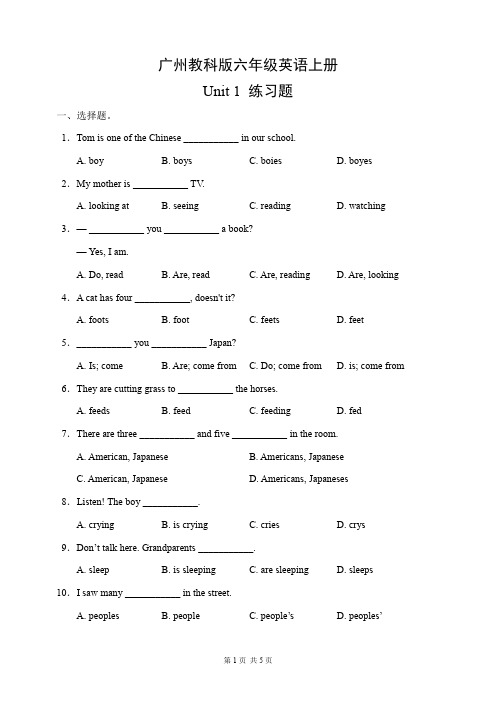
广州教科版六年级英语上册Unit 1 练习题一、选择题。
1.Tom is one of the Chinese ___________ in our school.A. boyB. boysC. boiesD. boyes 2.My mother is ___________ TV.A. looking atB. seeingC. readingD. watching 3.— ___________ you ___________ a book?— Yes, I am.A. Do, readB. Are, readC. Are, readingD. Are, looking 4.A cat has four ___________, doesn't it?A. footsB. footC. feetsD. feet5.___________ you ___________ Japan?A. Is; comeB. Are; come fromC. Do; come fromD. is; come from 6.They are cutting grass to ___________ the horses.A. feedsB. feedC. feedingD. fed 7.There are three ___________ and five ___________ in the room.A. American, JapaneseB. Americans, JapaneseC. American, JapaneseD. Americans, Japaneses8.Listen! The boy ___________.A. cryingB. is cryingC. criesD. crys 9.Don’t talk here. Grandparents ___________.A. sleepB. is sleepingC. are sleepingD. sleeps10.I saw many ___________ in the street.A. peoplesB. peopleC. people’sD. peoples’11.The green sweater is his ___________.A. brotheresB. brothersC. brother’sD. brother 12.Is the woman ___________ yellow your teacher?A. inB. putting onC. wearingD. having 13.Look! The twins ___________ their mother do the housework.A. are wantingB. helpC. are helpingD. are looking 14.___________ are the birds doing? They are singing in a tree.A. WhoB. WhatC. HowD. Where 15.Can you see nine ___________ in the picture?A. sheepsB. bookC. horseD. fish 16.The ___________ has two ___________.A. boy; watchB. boy; watchesC. boys; watchD. boy; watchs 17.The ___________ are flying back to their country.A. GermanyB. GermanysC. GermansD. Germen 18.The girl brushes her ___________ every day before she goes to bed.A. toothsB. teethC. teethsD. teethes 19.My uncle has three ___________.A. childB. childsC. childrenD. childrens 20.Kate ___________, the others ___________.A. sing, listenB. is singing, is listeningC. sing, are listeningD. is singing, are listening21.I ___________ my eraser, but I can’t ___________ it.A. look for, findingB. am finding, look forC. am looking for, findD. find, look for22.Who ___________ over there now?A. singingB. are singC. is singingD. sings23.It’s nine ten. The students ___________ a music class.A. haveB. havingC. are havingD. has24.I am ___________ America.A. comeB. come fromC. comesD. from 25.Do you have ______ books?A. any otherB. other anyC. anythingD. any others二、用所给词的适当形式填空。
【广州版】六年级英语上册 Unit 12 Christmas1
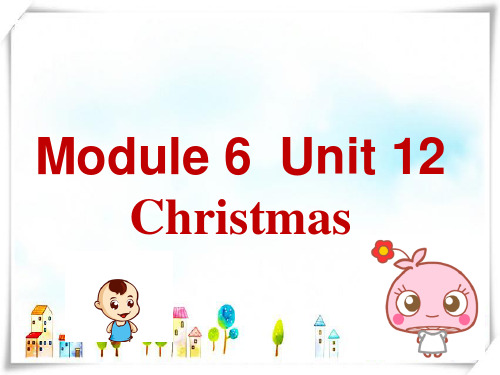
写 作 与 笔 记 使 人 精 确 ; 史 鉴 使 人 明 智 ; 诗
歌
使
人
巧
慧
;
我们,还在路上……
Spring Festival is the most important festival in China. It’s to celebrate the lunar calendar’s new year. The Spring Festival lasts about 15 days long.(在中国春节是最重要的节日。它是为 了庆祝农历新年。春节持续15天左右)
Christmas Spring Festival
• the 25th of December
• eat turkey and sausage
• get presents and cards
• Merry Christmas
• the 1st day of the 1st lunar month
• eat dumpling and fish
We can see lights in the streets. What do people give? They give presents. What do people send? They send cards.
Can you ___t_e_ll_ me about __C_h_r_is_tm__a_s?
It’s a very important ___f_e_s_ti_va_l_ in many countries. It is on the __2_5_th_ of December. People_p_u_tspecial trees in the their homes. There are _l_ig_h_t_sin the streets and shops. We give _p_r_e_s_e_n_ts_ and send __c_a_r_d_s. We love it!
2022年教科版广州六年级上册英语练习Unit12

教科版英语六年级上册Unit12练习一、单项选择。
( )1.Do you want to________the running race?A.take inB.take part inC.take part( )2.The Chinese New Year is _________in China.A.the Spring FestivalB.Children's DayC.Teachers' day( )3.I _________the house yesterday afternoon.A.cleaningB.cleansC.cleaned( )4.The lady is_________her clothes now.A.washingB.washesC.wash( )5.This is__________apple in the basket.A.biggestB.the biggestC.the bigest二、选出划线部分发音不同的一项。
( )1.A.lunar B.car C.park( )2.A.they B.tooth C.health( )3.A.heavy B.bean C.bread( )4.A.food B.foot C.bamboo( )5.A.ancient B.cake C.apple三、用所给动词的适当形式填空。
1.The boy never___________(go)to school after eight o'clock on weekdays.2.The men___________(swim)in the sea now.3.This dog___________(eat)lots of meat last night.4.Are your friends___________(read)books now5.He didn't___________(say)goodbye to me.6.Do you want___________(go)swimming with me?7.I___________(have)a toothache last week.8.Is he___________(milk)the cows?9.She didn't___________(feed)the rabbit.10.They are___________(plant)trees now.四、请按实际情况回答问题。
广州六年级上册英语 Unit 12 Christmas 教案重点内容和习题

Unit 12 Christmas一、词汇二、句型1. Christmas is the most important festival of the year.2. When is Christmas Day?三、课文翻译In many countries, Christmas is the most important festival of the year. Christmas is always on December 25th, and before that day people will put up a large Christmas tree in their home. Under the Christmas tree they put many gifts for everyone to share. Children are always very excited at Christmas because they can get many wonderful presents from Father Christmas. Father Christmas is a fat happy man in red clothes. He brings gifts to all the children. He comes to their home on the night before Christmas and puts their gifts under the tree or in a sock. Then on Christmas morning the children hurry to open their gifts. Families and friends come together on that day for a big Christmas lunch or dinner. They often eat ham, potatoes and a Christmas turkey. Everyone sings many wonderful Christmas songs. It really is a happy time.在许多国家,圣诞节是一年中最重要的节日。
Unit1-Unit12单词过关(试题)教科版(广州)英语四年级上册
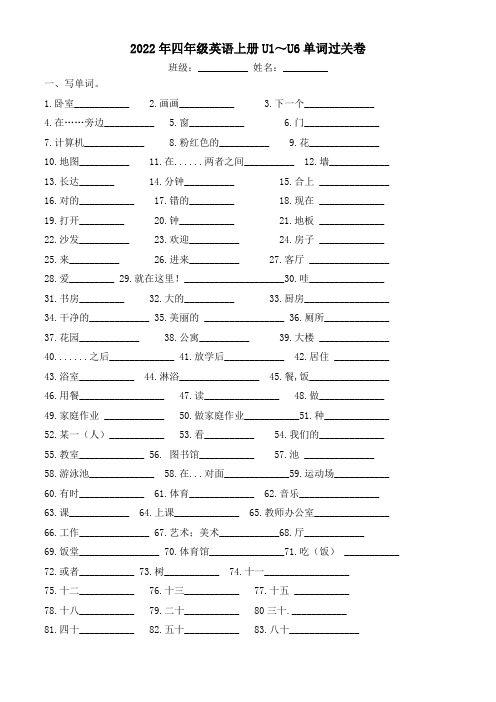
2022年四年级英语上册U1~U6单词过关卷班级:__________ 姓名:_________一、写单词。
1.卧室___________2.画画___________3.下一个______________4.在……旁边__________5.窗___________6.门_______________7.计算机____________8.粉红色的__________9.花______________ 10.地图__________ 11.在......两者之间__________ 12.墙____________ 13.长达_______ 14.分钟__________ 15.合上 ______________ 16.对的___________ 17.错的_________ 18.现在 _____________ 19.打开_________ 20.钟___________ 21.地板 _____________ 22.沙发__________ 23.欢迎__________ 24.房子 _____________ 25.来__________ 26.进来__________ 27.客厅 ________________ 28.爱_________ 29.就在这里!____________________30.哇_______________ 31.书房_________ 32.大的__________ 33.厨房_________________ 34.干净的____________ 35.美丽的 ________________ 36.厕所_____________ 37.花园____________ 38.公寓__________ 39.大楼 ______________ 40.......之后_____________ 41.放学后____________ 42.居住 ___________ 43.浴室___________ 44.淋浴________________ 45.餐,饭________________ 46.用餐_________________ 47.读_______________ 48.做_____________ 49.家庭作业 ____________ 50.做家庭作业___________51.种_____________ 52.某一(人)___________ 53.看__________ 54.我们的_____________ 55.教室_____________ 56. 图书馆___________ 57.池 ______________ 58.游泳池_____________ 58.在...对面_____________59.运动场___________ 60.有时_____________ 61.体育_____________ 62.音乐________________ 63.课____________ 64.上课_____________ 65.教师办公室_______________ 66.工作______________ 67.艺术;美术____________68.厅____________69.饭堂________________ 70.体育馆_______________71.吃(饭) ___________ 72.或者___________ 73.树___________ 74.十一_________________75.十二___________ 76.十三___________ 77.十五 ___________78.十八___________ 79.二十___________ 80三十.___________81.四十___________ 82.五十___________ 83.八十______________二、写短语。
广州版小学五年级英语上册1-12单元知识点归纳与习题
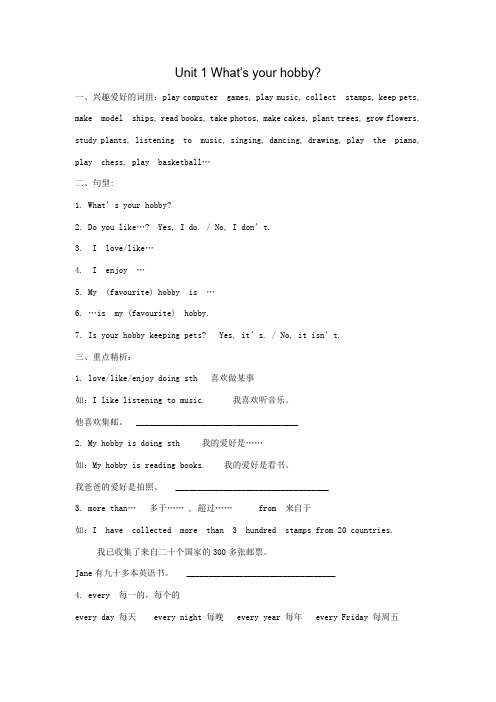
Unit 1 What’s your hobby?一、兴趣爱好的词组:play computer games, play music, collect stamps, keep pets, make model ships, read books, take photos, make cakes, plant trees, grow flowers, study plants, listening to music, singing, dancing, drawing, play the piano, play chess, play basketball…二、句型:1. What’s your hobby?2. Do you like…? Yes, I do. / No, I don’t.3. I love/like…4. I enjoy …5. My (favourite) hobby is …6. …is my (favourite) hobby.7. Is your hobby keeping pets? Yes, it’s. / No, it isn’t.三、重点精析:1. love/like/enjoy doing sth 喜欢做某事如:I like listening to music. 我喜欢听音乐。
他喜欢集邮。
_____________________________________2. My hobby is doing sth 我的爱好是……如:My hobby is reading books. 我的爱好是看书。
我爸爸的爱好是拍照。
___________________________________3. mo re than… 多于…… , 超过…… from 来自于如:I have collected more than 3 hundred stamps from 20 countries.我已收集了来自二十个国家的300多张邮票。
鲁教版(五四学制)六年级英语上册Unit5SectionB(3aselfcheck)说课稿

(四)总结反馈
在总结反馈阶段,我会引导学生进行自我评价,让他们回顾本节课的学习内容,分享自己的学习心得和遇到的困难。我会提出一些开放性问题,如:“你觉得自己在描述节日方面有哪些进步?”“你认为自己还需要在哪些方面提高?”通过这种方式,学生可以反思自己的学习过程。接着,我会根据学生的表现提供具体的反馈和建议,对于表现优秀的学生,我会给予肯定和鼓励;对于遇到困难的学生,我会提供个性化的指导,帮助他们找到解决问题的方法。
2.设计互动性强的小组活动,让学生在合作中学习和交流,提高他们的参与度和积极性。
3.创设真实的语言环境,让学生在模拟的节日庆祝活动中练习目标语言,增强学习的实用性和趣味性。
4.对学生的进步给予及时和积极的反馈,提高他们的自信心和学习动力。
5.结合学生的个人兴趣,鼓励他们探索和分享自己感兴趣的文化节日,使学习过程更加个性化。
3.在听力练习中,学生可能因为对英语语音的不敏感,或者对场景理解不够深入,导致听力理解能力不足。
4.部分学生可能因为缺乏自信,害怕犯错,从而影响他们的学习效果。
(三)学习动机
为了激发学生的学习兴趣和动机,我将采取以下策略或活动:
1.利用多媒体资源,如图片、视频和音频,展示不同节日的庆祝场景,引发学生的兴趣和好奇心。
(3)提高听力理解能力。
2.教学难点:
(1)对于一些生僻的节日名称,学生可能难以掌握。
(2)学生在描述节日庆祝活动时,可能无法准确运用所学句型和词汇。
(3)听力练习中的语音识别和场景理解可能对学生造成一定的困扰。
二、学情分析
(一)学生特点
本节课所面向的学生为鲁教版(五四学制)六年级的学生,他们大约11至12岁,正处于青春期早期。这个年龄段的学生具有以下特点:首先,他们的认知水平逐渐提高,能够理解更复杂的概念和信息;其次,学生的抽象思维开始发展,能够进行更深入的思考和推理;再次,他们对新鲜事物充满好奇心,学习兴趣广泛,但注意力可能容易分散;最后,他们在学习习惯上,已经开始形成一定的学习规律,但仍然需要教师的引导和监督。
沪教版六年级上册英语Unit12 The Earth知识点习题

Unit 12 The Earth 一、基本知识点(一)重点词汇:Earth [ɜːθ]n. 地球part [pɑːt]n.地区;地域forest ['fɒrɪst] n.森林land [lænd] n.陆地ocean ['əʊʃ(ə)n] n.海洋rubbish ['rʌbɪʃ] n.垃圾sick [sɪk] adj.生病的(二)短语:stop doing sth. 停止正在做的事情throw...into 把...扔进cut down 砍倒so/too many trees 太多树use plastic bags 使用塑料袋live on the Earth 居住在地球上get sick 生病pick up 捡起glass and paper 玻璃和纸their own 他们自己的shopping bags 购物袋write on both sides of paper 在纸的正反面写字(三)句型:1. What should we do to save the Earth?我们应该做什么来保护地球?2.We should stop cutting down so many trees.我们应该停止砍伐太多的树木。
3.Smoke from cars and factories makes the air dirty.汽车和工厂排出的烟污染了空气。
4.Can we do anything to help the Earth?我们能够做些什么来帮助地球吗?5.Now people work together to keep the Earth clean and healthy.现在人们共同努力来使地球保持清洁和健康。
6.There are many different plants and animals, too.也有许多不同的植物和动物。
(四)重难点、易错点:1. the Earth 冠词用法,the+世界上独一无二的名词2. too many; too much 两者的区别3. 不可数名词二、典型例题(一)匹配意思相符的两项so many 捡起plastic bag 生病,患病get sick 如此多work together 购物袋pick up 塑料袋shopping bag 一起工作【解析】答案:考查基础词汇,so many—如此多,plastic bag—塑料袋,get sick—生病,患病,work together—一起工作,pick up—捡起,shopping bag—购物袋(二)单项选择( )1. The green and brown parts are ________ and land.A. treesB. grassC. forest【解析】答案:C 根据句意:“绿色和棕色的部分是________ 和陆地”。
2019年最新广州版六年级英语上册Unit--Unit12知识点及练习题
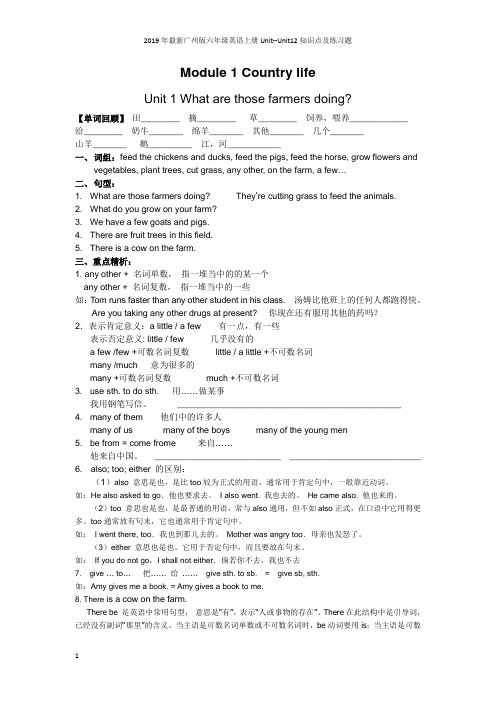
Module 1 Country lifeUnit 1 What are those farmers doing?【单词回顾】田________ 摘________ 草________ 饲养,喂养____________给________ 奶牛_______ 绵羊_______ 其他_______ 几个_______山羊_______ 鹅_________ 江,河___________一、词组:feed the chickens and ducks, feed the pigs, feed the horse, grow flowers andvegetables, plant trees, cut grass, any other, on the farm, a few…二、句型:1. What are those farmers doing? They’re cutting grass to feed the animals.2. What do you grow on your farm?3. We have a few goats and pigs.4. There are fruit trees in this field.5. There is a cow on the farm.三、重点精析:1. any other + 名词单数,指一堆当中的的某一个any other + 名词复数,指一堆当中的一些如:T om runs faster than any other student in his class. 汤姆比他班上的任何人都跑得快。
Are you taking any other drugs at present? 你现在还有服用其他的药吗?2.表示肯定意义:a little / a few 有一点,有一些表示否定意义: little / few 几乎没有的a few /few +可数名词复数little / a little +不可数名词many /much 意为很多的many +可数名词复数much +不可数名词3. use sth. to do sth. 用……做某事我用钢笔写信。
【月考卷】六年级上册英语第一次月考卷Unit12人教PEP版-含答案
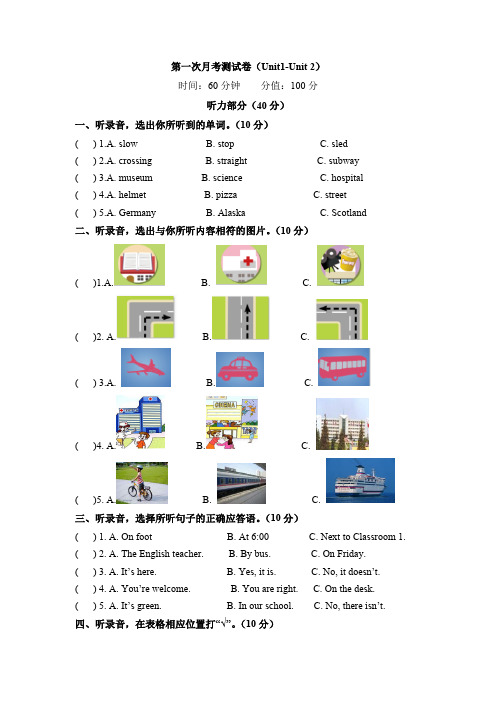
第一次月考测试卷(Unit1-Unit 2)时间:60分钟 分值:100分听力部分(40分)一、听录音,选出你所听到的单词。
(10分)( ) 1.A. slow B. stop C. sled( ) 2.A. crossing B. straight C. subway( ) 3.A. museum B. science C. hospital( ) 4.A. helmet B. pizza C. street( ) 5.A. Germany B. Alaska C. Scotland二、听录音,选出与你所听内容相符的图片。
(10分)( )1.A. B. C.( )2. A. B. C.( ) 3.A. B. C.( )4. A. B. C.( )5. A. B. C.三、听录音,选择所听句子的正确应答语。
(10分)( ) 1. A. On foot B. At 6:00 C. Next to Classroom 1. ( ) 2. A. The English teacher. B. By bus. C. On Friday.( ) 3. A. It’s here. B. Yes, it is. C. No, it doesn’t.( ) 4. A. You’re welcome. B. You are right. C. On the desk.( ) 5. A. It’s green. B. In our school. C. No, there isn’t. 四、听录音,在表格相应位置打“√”。
(10分)Father Mother Aunt Uncle Grandma Grandpa Sarah On footBy bikeBy subwayBy carBy bus笔试部分(60分)五、选出每组单词中不同类的一项。
(5分)( ) 1.A. bookstore B. follow C. post office( ) 2.A. left B. right C. plane( ) 3.A. helmet B. taxi C. subway( ) 4.A. pizza B. salad C. GPS( ) 5.A. restaurant B. Alaska C. Australia六、单项选择。
牛津沪教版英语六年级上册Unit1-Unit12全册同步练习题
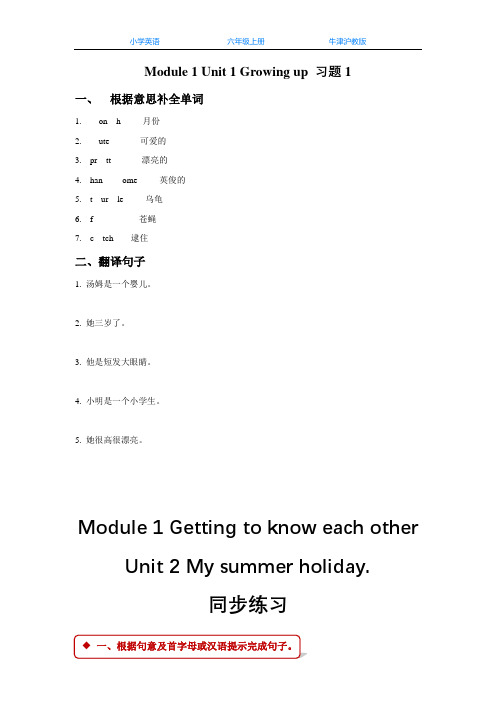
Module 1 Unit 1 Growing up 习题1一、根据意思补全单词1.__on__h 月份2.__ute 可爱的3.pr__tt__ 漂亮的4.han__ __ome 英俊的5.t__ur__le 乌龟6.f__ __ 苍蝇7.c__tch 逮住二、翻译句子1. 汤姆是一个婴儿。
______________________________2. 她三岁了。
______________________________3. 他是短发大眼睛。
______________________________4. 小明是一个小学生。
______________________________5. 她很高很漂亮。
______________________________Module 1 Getting to know each other Unit 2 My summer holiday.同步练习1. Thanks for __________ (同意) to let me watch the match on TV.2. The city streets are full of (来往车辆).3. Xi Jinping is the ______________(国家主席) of China.4. The children took a boat ________________(旅行) along the Yellow River last Sunday.5. We had to move _________(里面)when it started to rain.6. I’m p________ for the trip to Guangzhou. It will cost a lot of money.7. They a_______ at the stop too late, so they missed the bus.8. The teacher w__________ who broke the window.9. Our team w________the basketball match final today.10. He stayed at home and watched TV i___________of going out to play with his friends.11. Thank you very much for keeping the secret to ________________(you).12. _______ (lucky), he didn’t catch the last train to Shanghai.13. When you walk slowly around the lake, you can feel the _______(beautiful) of this city.14. He writes ___________ (care) in his class.15. Yesterday he ________ (drive) to his office, but this morning he _____ (ride) there.16. I _________(plan) the trip to the Temple of Heaven at present.17. Many people go to Beijing to visit the places of __________(interest).18. They listened to some music at the ________(begin) of the meeting.19. The scientists told us some stories about _________(amaze) UFOs.20. It’s _________(real) fun to learn foreign languages.( )21. Millie found _______difficult to play the piano well.A. it’sB. i tC. thatD. this( )22. Thank you for _______ let me _______ fishing with you today.A. agreeing; goB. agree; goC. agreeing to; goD. agree to; go ( )23. China is a big country ________ a long history.A. andB. butC. hasD. with( )24. No one taught ________ English. He learned it _________.A. him; by himselfB. his; by himselfC. him; himselfD. his; by himself ( )25. The trip _______ about 3 hours from the school to the park.A. costB. usedC. spentD. took( )26. There ________ a lot of traffic in the daytime.A. areB. isC. are goingD. will have( )27. Tom arrived _______a warm spring morning.10.at B. on C. in D. by( )28. He told Tom _______ read in the sun because it was bad for his eyes.A. toB. doesn’tC. not toD. to not( )29. Work hard, _______ you will fall behind others.A. andB. orC. butD. so( )30. He always thinks more of ________ than of _______.A. him; otherB. the other; himC. hims elf; the otherD. others; himself ( )31. Why ________ come to school earlier?A. not toB. notC. don’tD. don’t to( )32. ________ take a bus to go the Palace Museum.A. Let’sB. LetC. What aboutD. Why don’t( )33. Hurry up, _______ you will catch the early bus.A. andB. butC. orD. so( )34. Don’t touch the machine, children, or you ma y hurt _______.A. yourselfB. myselfC. themselvesD. yourselves ( )35. Will you choose ________ in the front of the bus ________ in the back?A.to sit; andB. sitting; butC. sit; orD. to sit; or36.He came and gave us a talk last Sunday. (改为简单句)He came ________ ________us a talk last Sunday.37.Kitty planned to visit the park with her friends. (对画线部分提问)________ ________ Kitty plan to________ with her friends?38.I learned English all by myself. (改为同义句)I _________ _________ English.39.We must reach the post office as soon as we can.(改为同义句)We must _____ to the post office as soon as______.40.She wonders what she should do next.(改为同义句)She _______ ________ ________ what ________ ________ next41.The cost is 50 yuan __________ _________ (每人).42.We will take the bus _________ _________ _________ (一路上) to the museum.43.If you want to come, please let me know________ ________ ________ ________ (尽快).44.We should _________ __________ _________ __________ __________(保密).参考答案1.agreeing2.traffic3.President4.trip5.inside6.planning7.arrived8.wondered9.won10.instead1. yourself2. Unluckily3. beauty4. the most carefully5.drove; rode 6. planning 7. interest 8. beginning 9. amazing 10. really 21-25 BCDAD 26-30 BBCBD 31-35 BAADD 36. to give 37. Where did do 38. taught myself 39. get possible 40. wants to know to do41. each person 42. all the way 43. as soon as possible 44. keep the secret to ourselvesModule 1 Getting to know each otherUnit 3 Healthy or unhealthy?同步练习1. 我厌倦了整天待在家里。
(完整word版)Unit12Whatdidyoudolastweekend全单元教案

Unit 12 What did you do last weekend?Learning Objectives一、Topics(话题):Weekend activities二、Functions (功能)Talk about past events三、Structures (结构)1. Simple past tense (II)2。
What questions3. Who questions四、Target Language (目标语言)How was your weekend?It was great。
What did you do last weekend?I played soccer。
Who did you play with?I played with my friend.五、Vocabulary (词汇)lake, beach, sheep, kite, moon, snake, forest, surprise, pretty, natural, shout, fly, stay, move, jump, wakecamp by the lake, go to the beach, play badminton, stay up late, fly a kite, get a terrible surprise, shout at/to …, wake … up, put up …, jump up and down六、Skills (技能)Listening for key informationScanning in reading七、Recycling (复习巩固)do homework, go shopping, play computer games, play sports, watch a movie, stay at home, visit friends, study for a test, cook dinner, kind of tiredHow was …? What did you do …? Did you have …?八、教材分析本单元是本册教材的最后一个单元,以复习为主,一方面复习之前学过的很多动词短语,一方面通过以谈论上周末的活动为话题,继续巩固学习一般过去时态的应用。
- 1、下载文档前请自行甄别文档内容的完整性,平台不提供额外的编辑、内容补充、找答案等附加服务。
- 2、"仅部分预览"的文档,不可在线预览部分如存在完整性等问题,可反馈申请退款(可完整预览的文档不适用该条件!)。
- 3、如文档侵犯您的权益,请联系客服反馈,我们会尽快为您处理(人工客服工作时间:9:00-18:30)。
Module 1 Country lifeUnit 1 What are those farmers doing?【单词回顾】田________ 摘________ 草________ 饲养,喂养____________给________ 奶牛_______ 绵羊_______ 其他_______ 几个_______山羊_______ 鹅_________ 江,河___________一、词组:feed the chickens and ducks, feed the pigs, feed the horse, grow flowers andvegetables, plant trees, cut grass, any other, on the farm, a few…二、句型:1. What are those farmers doing? They’re cutting grass to feed the animals.2. What do you grow on your farm?3. We have a few goats and pigs.4. There are fruit trees in this field.5. There is a cow on the farm.三、重点精析:1. any other + 名词单数,指一堆当中的的某一个any other + 名词复数,指一堆当中的一些如:T om runs faster than any other student in his class. 汤姆比他班上的任何人都跑得快。
Are you taking any other drugs at present? 你现在还有服用其他的药吗?2.表示肯定意义:a little / a few 有一点,有一些表示否定意义: little / few 几乎没有的a few /few +可数名词复数little / a little +不可数名词many /much 意为很多的many +可数名词复数much +不可数名词3. use sth. to do sth. 用……做某事我用钢笔写信。
______________________________________________4. many of them 他们中的许多人many of us many of the boys many of the young men5. be from = come frome 来自……他来自中国。
__________________________ ___________________________ 6. also; too; either 的区别:(1)also 意思是也,是比too较为正式的用语,通常用于肯定句中,一般靠近动词。
如:He also asked to go.他也要求去。
I also went. 我也去的。
He came also. 他也来的。
(2)too 意思也是也,是最普通的用语,常与also通用,但不如also正式,在口语中它用得更多。
too通常放有句末,它也通常用于肯定句中。
如:I went there, too.我也到那儿去的。
Mother was angry too.母亲也发怒了。
(3)either 意思也是也。
它用于否定句中,而且要放在句末。
如:If you do not go,I shall not either.倘若你不去,我也不去7. give … to…把……给……give sth. to sb. = give sb, sth.如:Amy gives me a book. = Amy gives a book to me.8. There is a cow on the farm.There be 是英语中常用句型,意思是“有”,表示“人或事物的存在”。
There在此结构中是引导词,已经没有副词“那里”的含义。
当主语是可数名词单数或不可数名词时,be动词要用is;当主语是可数名词复数时,be动词要用are;而它的否定形式是在be动词后面加not。
同时,改为一般疑问句只需要把be动词提前。
肯定回答为“Yes, there be.”否定回答为”No, there be not.”如:There are five books, two pens and a ruler in the school bag.There is a ruler, two pens and five books in the school bag.四、重点语法:(一)名词单复数:(1)从单数变复数,变形规则如下:1.一般情况下,直接加-s,如:book-books, bag-bags, cat-cats, bed-beds2.以s. x. sh. ch结尾,加-es,如:bus-buses, box-boxes, watch-watches3.以“辅音字母+y”结尾,变y为i, 再加-es,如:family-families(家庭), strawberry-strawberries(草莓)4.以“f或fe”结尾,变f或fe为v, 再加-es,如:knife-knives5.不规则名词复数:man-men, woman-women, policeman(男警察)-policemen, policewoman(女警察)-policewomen, mouse-mice child(孩子)-children foot-feet,. tooth-teeth 单复同行:fish-fish, sheep(羊)-sheep people-people, Chinese-Chinese, Japanese-Japanese6. 注意:当people后加上s时,即peoples表示“民族”例如:There are 56 peoples in China. 中国有56个民族。
7. 不可数名词:water(水) milk(牛奶) tea(茶) rice(米饭) orange(橙汁)juice(果汁)bread(面包)等注意:1)可数名词,当表示“1”时用a还是an,由后面的单词的首个因素决定,辅音音素前用“a”,元音音素前用“an”。
如:a book an English book 2)不可数名词前不能用a或an,常用some,much,a little,a lot of,plenty of表示多少3)用单位词表示,即用a…of + 名词表示。
如:a cup of 一杯…… a bottle of 一瓶…… a piece of 一张……a basket of 一篮…… a can of 一罐…… a bag of 一袋……a pair of shoes 一双鞋two cups of tea 两杯茶five pieces of paper 五张纸【练习一:】写出下列各词的复数I _______ this ___________ that___________ watch _______ child _______ photo ________ diary _________ day________ foot________ book_______ dress ________ tooth_______ sheep ______ box_______ strawberry _______ thief _______ peach______ sandwich _______ man______ woman_______ paper_______ juice_______ water________ milk________ rice__________ tea________【练习二:】将下列词组翻译成英文[1]三杯牛奶_____________________ [2] 一袋大米 __________________[3]三篮子苹果___________________ [4]一碗面条 ___________________ [5]四杯茶_______________________ [6]七瓶水_____________________ [7]五袋子大米___________________ [8]三罐橘汁__________________ [9]八条新闻___________________ [10]一箱香蕉__________________ (二)现在进行时:现在进行时表示现在或当前正在进行的动作。
基本结构:be(am,is,are)+ doing动词现在分词(-ing)1.-ing 2.去e+ing 3.双写+ing(如:get, begin, sit, fit, swim, shop, drop, stop, run, cut, put双写+ing)现在进行时提示词:___________________________________________________________基本结构:_______________________________________________________现在进行时的否定形式:在be动词后面加not。
如:He is not doing his homework.改为一般疑问句:把be动词提前。
肯定回答用“Yes, 主语+ be.”否定回答用“No, 主语+be not.”如:Are you reading. Yes, I’m.特殊疑问句:特殊疑问词+be+主语+动词ing形式+其他?如:What are you doing?写出下列词的ing形式play________ run__________ swim _________ make__________go_________ like________ write________ ski___________read________ have_________ sing ________ dance_________put_________ see________ buy _________ love__________live_______ take_________ come ________ get_________stop________ sit ________ begin________ shop___________【即时演练】一、选择题。
( ) 1. Tom is one of the Chinese _____ in our school.A. boyB. boysC. boiesD. boyes( ) 2.My mother is _____TV.A. looking atB. seeingC. readingD. watching( ) 3.---____you ____a book? ---Yes,I am.A. Do, readB. Are, readC. Are, readingD. Are, looking( ) 4. A cat has four ____ , doesn't it?A. footsB. footC. feetsD. feet( ) 5. _____ you _____ Japan?A. Is; comeB. Are; come fromC. Do; come fromD. is; come from( ) 6. They are cutting grass to ______ the horses.A. feedsB. feedC. feedingD. fed( ) 7. There are three ____ and five _____ in the room.A. American, JapaneseB. Americans, JapaneseB. C. American, Japanese D. Americans, Japaneses( ) 8. Listen! The boy _______.A. cryingB. is cryingC. criesD. crys( ) 9. Don’t talk here. Grandparents ______.A. sleepB. is sleepingC. are sleepingD. sleeps( ) 10.I saw many _____ in the street.A. peoplesB. peopleC. people’sD. peoples’( ) 11.The green sweater is his _________.A. brotheresB. brothersC. brother’sD. brother( ) 12. Is the woman ______ yellow your teacher?A. InB. putting onC. wearingD. having( ) 13. Look! The twins _____their mother do the housework.A. are wantingB. helpC. are helpingD. are looking( ) 14_____are the birds doing? They are singing in a tree.A. WhoB. WhatC. HowD. Where( ) 15. Can you see nine ____ in the picture?A. sheepsB. bookC. horseD. fish( ) 16. The _____ has two______.A. boy; watchB. boy; watchesC. boys; watchD. boy; watchs ( ) 17. The _____ are flying back to their country.A. GermanyB. GermanysC. GermansD. Germen( ) 18. The girl brushes her _____ every day before she goes to bed.A. toothsB. teethC. teethsD. teethes( ) 19.My uncle has three _______.A. childB. childsC. childrenD. childrens( ) 20.Kate _____,the others _____.A. sing, listenB. is singing, is listeningC. sing, are listeningD. is singing, are listening( ) 21.I ___my eraser, but I can’t ______ it.A. look for, findingB. am finding, look forC. am looking for, findD. find, look for( ) 22. Who ______ over there now?A. singingB. are singC. is singingD. sings( ) 23. It’s nine ten. The students ______ a music class.A. haveB. havingC. are havingD. has( ) 24. I am _____America.A. comeB. come fromC. comesD. from( ) 25. Do you have ______ books?A. any otherB. other anyC. anythingD. any others二、用所给词的适当形式填空。
